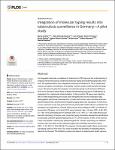Integration of molecular typing results into tuberculosis surveillance in Germany—A pilot study
Andrés, Marta
Göhring-Zwacka, Elke
Fiebig, Lena
Priwitzer, Martin
Richter, Elvira
Rüsch-Gerdes, Sabine
Haas, Walter
Niemann, Stefan
Brodhun, Bonita
An integrated molecular surveillance for tuberculosis (TB) improves the understanding of ongoing TB transmission by combining molecular typing and epidemiological data. However, the implementation of an integrated molecular surveillance for TB is complex and requires thoughtful consideration of feasibility, demand, public health benefits and legal issues. We aimed to pilot the integration of molecular typing results between 2008 and 2010 in the German Federal State of Baden-Württemberg (population 10.88 Million) as preparation for a nationwide implementation. Culture positive TB cases were typed by IS6110 DNA fingerprinting and results were integrated into routine notification data. Demographic and clinical characteristics of cases and clusters were described and new epidemiological links detected after integrating typing data were calculated. Furthermore, a cross-sectional survey was performed among local public health offices to evaluate their perception and experiences. Overall, typing results were available for 83% of notified culture positive TB cases, out of which 25% were clustered. Age
No license information

